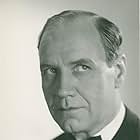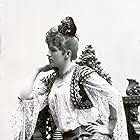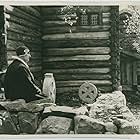Whether he was making pictures in his native Sweden or in the United States, there cannot possibly be any dispute that Victor Sjöström was an early master of the medium. Of any of his silent films that I've watched, which at this point is all but a couple of those that I've searched high and low to find, I'm firmly of the mind that all were perfect; several I'd readily name among the best movies I've ever seen, if not likely among the very best ever made, period. Sjöström had a tremendously shrewd knack for making the very setting and surrounding environment a major part of his narratives, practically a character unto themselves, and even putting that aside, as both writer and especially director he gave his features stark power that fueled and enhanced the drama. I surely can't speak to a novel I haven't read, but the man's rendition of it in the new medium quite comes off on a superficial level as being much more ordinary an affair: a story of domestic troubles and conflicts of words between people, contrasting sharply with the taut psychological torment of 'He who gets slapped' or 'The wind,' or the sagas of 'The outlaw and his wife' or 'A man there was' that pointedly drew Mother Nature into the storytelling. Yet one should never doubt Sjöström, for once again 'Tösen från Stormyrtorpet,' alternatively known as 'The lass from the stormy croft,' ultimately makes a very solid impression. It may not be as readily absorbing as some of the filmmaker's other works, but at length this is just as satisfying and worthy, and another fine credit to an icon.
The tale is simple, but carries important and admirable themes - honesty, conscience, modest, humility, consideration of others - and is all that it needs to be to keep us engaged and attentive. Here is juxtaposed a kind, virtuous young woman, who ever thinks of others before herself, juxtaposed with those who look down upon her due to prejudice and what they perceive as a moral failing by the standards of antiquated, hypocritical values. Add into the mix feelings of love and responsibility, and the stage is set for an ably engrossing, enjoyable film. In fairness, this isn't 100% perfect: as it presents there are some rough edges in the sequencing and editing at large, though in fairness this might well reflect deterioration in a surviving digitalized print as much as any shortcoming on the part of the production. I would also observe that, curiously, there are instances of makeup work here that are garishly heavy-handed, uneven, and unnatural, distinctly betraying the artifice. With that having been said, to be honest these are the only specific points of criticism that come to mind for me to raise, which tells me that the movie has done quite well for itself, for in all other capacities this is rather terrific. No, it may not be an outright tour de force, but there are splendid small details in the screenplay Sjöström adapted with Ester Julin, and his mindful direction is just as careful to bring it all to vivid life. Every shot and scene is orchestrated with a low-key potency to make the moment count, and while the acting may somewhat bear the recognizable trait from early in the silent era of exaggerated body language and facial expressions, nevertheless I think the cast tend to give strong performances that suitably help to realize the saga.
It bears repeating that 'Tösen från Stormyrtorpet' is not immediately striking as Sjöström's other pictures are, and in broad terms it's not likely to stand out in a crowd. Even for all the strength that it ultimately bears, this is a comparatively restrained and conventional drama that mostly fits in neatly among the works of countless contemporary filmmakers whose oeuvres were decidedly less remarkable than the Swede's. Yet under the surface is skill and intelligence that in some measure helps it to stand apart, and on its own merits it remains a welcome addition to a body of work that is, far and away, outstanding. Perhaps it's not a total must-see, yet as far as I'm concerned this 1917 feature is generally just as deserving of recognition and remembrance as anything else Sjöström made in the silent era, and I'm happy to recommend it to anyone who is a fan of the style.




















